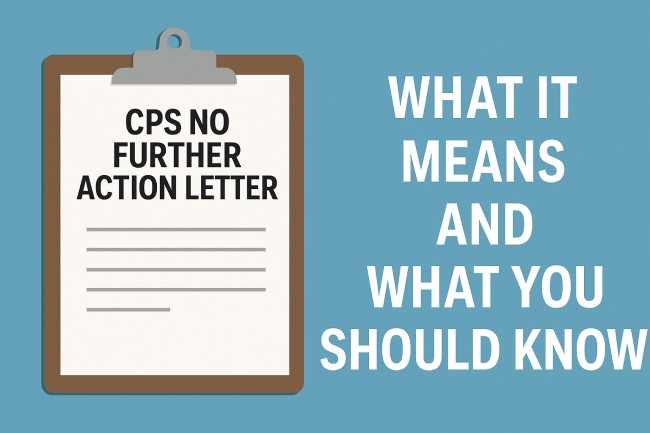CPS No Further Action Letter: What It Means and What You Should Know

Understanding the CPS No Further Action Letter
When Child Protective Services (CPS) investigates a report of child abuse or neglect, the process can be stressful and overwhelming for families involved. One outcome that families might receive after such an investigation is a CPS No Further Action (NFA) Letter. This document marks an important turning point in the case, but it often raises questions about its meaning and implications.
In this article, we will explore what a CPS No Further Action Letter signifies, how the decision is made, what it means for families, and what steps you should consider after receiving one. By the end, you’ll have a clear understanding of this important CPS communication.
What Is a CPS No Further Action Letter?
Definition and Purpose
A CPS No Further Action Letter is a formal notification from Child Protective Services indicating that after investigating the allegations, the agency has decided to close the case without pursuing any additional measures. Essentially, this letter means that CPS will take no further steps in the matter.
Why Does CPS Issue an NFA Letter?
The decision to issue an NFA letter typically follows a thorough investigation. CPS may determine that:
-
The allegations of abuse or neglect were unsubstantiated—meaning there was insufficient evidence to confirm the claims.
-
The child is deemed safe, with no current risk of harm.
-
The family has complied with any recommended services or interventions successfully, such as counseling or parenting programs.
-
There is no need for ongoing monitoring or legal intervention.
In these situations, CPS closes the case and issues the NFA letter to formally communicate that no further action will be taken.
What Does Receiving a CPS No Further Action Letter Mean?
It’s Not a Declaration of Innocence or Guilt
It is important to understand that an NFA letter is not a court judgment. The letter simply means that CPS does not intend to continue involvement based on the investigation’s findings. It is not a declaration of innocence or guilt. CPS’s role is protective, not punitive, so the letter reflects a decision regarding child safety, not a legal ruling.
Case Closure vs. Reopening Possibility
While the case is closed, it is crucial to realize that CPS can reopen an investigation if new information arises. The NFA letter does not mean the matter is permanently closed if further concerns or evidence come to light.
How Does It Affect Your Family?
For families, receiving this letter can bring relief as it signals an end to CPS’s scrutiny. However, the experience may still leave emotional or legal impacts, particularly if there were allegations that affected relationships or custody arrangements.
The Process Behind the No Further Action Decision
Investigation Stages
When CPS receives a report, the investigation process generally involves:
-
Initial Assessment: CPS evaluates the report’s credibility and urgency.
-
Investigation: Interviews with the child, family members, and others involved; review of evidence.
-
Decision: CPS determines if the child is at risk or if services are needed.
-
Outcome Notification: The family receives a letter explaining the outcome—this could be an NFA letter if no further action is necessary.
Factors Influencing the Decision
Several factors influence whether CPS issues an NFA letter:
-
Evidence Quality: The strength and credibility of information collected.
-
Child’s Safety: Whether the child is currently safe in their environment.
-
Family Compliance: Willingness and ability to follow through on any CPS recommendations.
-
Risk Assessment: Professional judgment about the likelihood of harm in the future.
What to Do After Receiving a CPS No Further Action Letter
Review the Letter Carefully
It is essential to read the NFA letter thoroughly. Confirm that the details such as names, dates, and case information are correct. Understanding exactly what CPS has concluded can help clarify your position.
Keep the Letter for Your Records
Store the NFA letter safely, as it may serve as important documentation in any future legal or custody discussions. This document proves that CPS investigated and decided not to proceed.
Consider Consulting a Legal Professional
If you have concerns about the CPS investigation or the implications of the letter, consulting a family law attorney can be valuable. A lawyer can help interpret the letter, advise on rights and next steps, and support you if issues arise later.
Be Prepared for Possible Future Contact
Although the letter indicates the case is closed, CPS retains the authority to reopen investigations. Stay alert to any new reports or follow-ups from CPS, especially if circumstances change.
Common Questions About CPS No Further Action Letters
Does an NFA Letter Affect Custody or Visitation Rights?
Receiving an NFA letter means CPS is not taking further action, but it does not automatically resolve custody or visitation disputes. Courts may consider CPS findings as part of custody evaluations, but family courts make decisions based on a broader range of evidence.
Can I Appeal or Challenge the CPS Decision?
Typically, CPS decisions to close a case are administrative and not subject to formal appeal. However, if you believe the investigation was mishandled or the decision was unfair, you can consult legal counsel about possible options.
What Happens if New Abuse Is Reported After an NFA Letter?
If new credible information emerges, CPS can reopen the case and conduct a new investigation. An NFA letter is not a permanent shield against future investigations.
Final Thoughts
A CPS No Further Action Letter marks an important moment in the child protection process, signifying that, at least for now, CPS will not pursue further intervention. While it can bring relief to families, it is vital to understand what this letter truly means and how it fits into the broader legal and child welfare landscape.
If you receive such a letter, approach it with care: review the details, keep documentation, consider professional advice, and remain aware of the possibility of future developments. Being informed empowers you to respond thoughtfully and protect your family’s interests.



